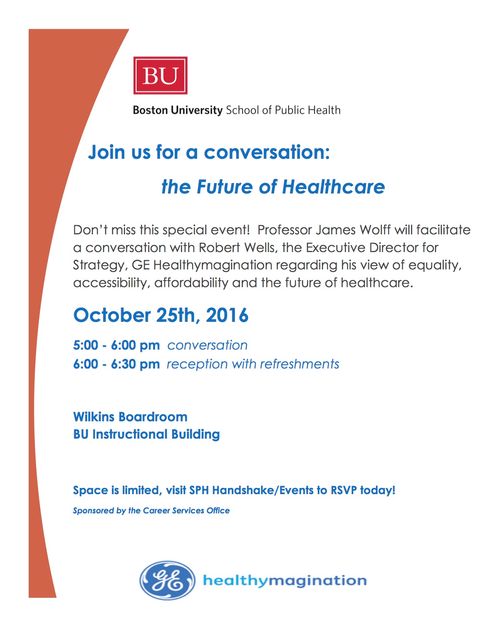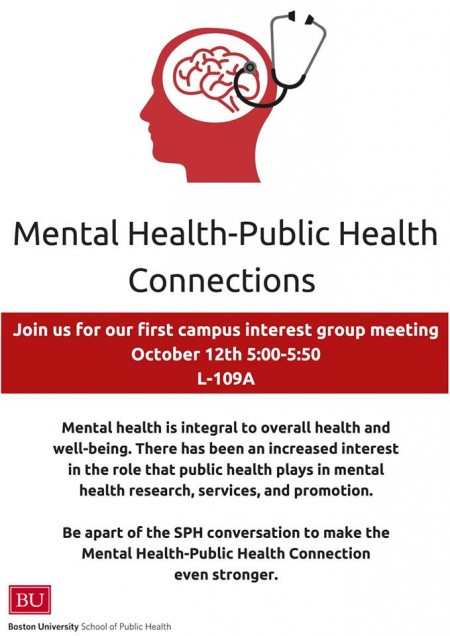Global Health Symposium – International Education Week 11/17
Date: November 17th 9:00 am – 1:00 pm
Location: Metcalf Trustee Center, 9th Floor, 1 Silber Way
Career Services DIME(S) Event! Where are the Jobs in Global Health? 10/20
Join Gwenn Fairall, Jeff Waller, & Justine de Marrais for PIZZA and guidance about where to find jobs in Global Health!
10/20 5:00-5:50pm
Wolffy facilitates “The Future of Healthcare” conversation 10/25
RSVP on Handshake for this special event. A conversation with Robert Wells the Executive Director for Strategy, GE Healthymagination
10/25 5-6:30pm
Pre-register for high demand GH courses by October 13
Pre-registration for high demand GH courses, GH722, GH743, and GH804 is now open. If interested please complete the form by October 13
Mental Health – Public Health Connections meeting 10/12
To celebrate: World Mental Health Day coming on Monday, October 10th, join us for the first Mental Health - Public Health Connections campus interest group meeting Wednesday October 12th from 5-5:50pm in L109A.
Earlier this year The World Bank and the WHO held a two-day series of events focused on Making Mental Health a Global Development Priority and bringing Mental Health “Out of the Shadows”. Our first meeting will focus on the importance of bringing mental health ‘out of the shadows’ both on our campus and throughout our work in Public Health.
Burden & Impacts of Heavy Metal Exposures in LMICs 10/7
GIJS VAN SEVENTER ENVIRONMENTAL HEALTH SEMINAR
Friday October 7th 12:45-1:45pm
Founder of Global Burden of Disease approach, Christopher J. L. Murray, MD, DPhil coming to BU! 10/26
17th Annual Dudley Allen Sargent Distinguished Lecture Presented by
Christopher J. L. Murray, MD, DPhil
Professor of Global Health, University of Washington
Director, Institute for Health Metrics and Evaluation (IHME)
Wednesday, October 26, 4:00-5:00 p.m.
BU Sargent College, Room 101
635 Commonwealth Avenue
Boston, Massachusetts
A physician and health economist, Dr. Christopher Murray’s work has led to the development of a range of new methods and empirical studies to strengthen health measurement, analyze the performance of public health and medical care systems, and assess the cost effectiveness of health technologies. Dr. Murray is a founder of the Global Burden of Disease (GBD) approach, a systematic effort to quantify the comparative magnitude of health loss due to diseases, injuries, and risk factors by age, sex, and geography over time. He led the collaboration of nearly 500 researchers from 50 countries that produced the Global Burden of Diseases, Injuries, and Risk Factors Study 2010. Dr. Murray was profiled in “Epic Measures: One Doctor. Seven Billion Patients” written by journalist Jeremy N. Smith.
All attendees are invited to a reception following the lecture in the Sargent College Setterberg Lounge.
Admission is free. The public is welcome.
Contact Katy Staley at or 617-353-2705 for more information or to request special accommodations. You may also contact BU Disability Services at access@bu.edu.
Breaking through limitations: Women’s Self-Help Institutions in India as vehicles for health & social transformation
Come join us and hear from visiting guest lecturers from India who have worked closely with Research Scientist Jenny Ruducha from the Department of Global Health.
Previous students have had practicum experiences with Rajiv Gandhi Mahila Vikas Pariyojana (RGMVP) in Uttar Pradesh, India. RGMVP is currently scaling up women’s Self Help Groups and behavior change and health systems linkages interventions. This talk would be a great networking opportunity for individuals interested in pursuing a practicum with the organization, specifically working with women's Self Help Groups.
Dean Galea on: Trauma as a Foundational Cause of Population Health: Implications for Providers 10/5
Wednesday, Oct. 5
8-9 a.m.
Crosstown Building, Second floor, 2128
Please join the Community Medicine Unit of BUSM and the Department of General Internal Medicine for the annual Kathy Bennett Memorial Lecture in Community Medicine. This year, we are lucky to have BUSPH Dean Sandro Galea, MD, DrPH (view profile), as our lecturer.
Abstract from his presentation:
"Trauma is a near ubiquitous human experience. Trauma has implications for mental and physical health of whole populations. We will discuss how trauma stands to inflect the trajectory of population health and how efforts to mitigate the consequences of trauma can improve the health of populations substantially."





![EH Seminar 10.7[1] copy](/ghblast/files/2016/10/EH-Seminar-10.71-copy-491x636.jpg)

![Oct 5 Meeting_RGMVP[1] copy](/ghblast/files/2016/09/Oct-5-Meeting_RGMVP1-copy-491x636.jpg)
